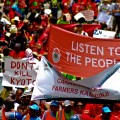ADP Opening Plenary Wrap
Andres Fuentes | November 14, 2013.
The Ad-hoc Working Group on the Durban Platform for Enhanced Action (ADP) opened its fifth plenary meeting on day two of COP19. The ADP welcomed two new chairs, Mr. Kichan Mumarsingh from Trinidad and Tobago and Mr. Arthur Runge-Metzger from the European Union, as it enters its fifth session.
There were some common themes in statements including the need: to scale up the pre-2020 ambitions for the necessary reduction of green house gases, for progress on pre- and post-2020 agreements and a detailed work plan until 2015.
There were clear divides when it came to temperature rise targets, with developed countries discussing two degrees and developing countries discussion one point five degrees target.
Developing nations also focused strongly on the need to maintain the principles and provisions of the UNFCCC convention, including past decisions. This is specifically relevant with the common but differentiated responsibilities principle.
Below is our summary of what happened.
G77+China (represented by Fiji)
Fiji highlighted the need for any agreement to be legal and the process needed to be party driven and transparent. They also mentioned that the G77 countries and China had made a larger contributions to combating climate change than developed countries in the pre-2020 period.
Africa Group (represented by Swaziland)
Swaziland expressed concerns that there was too much focus on the post 2020 agreement and a balance approach was encouraged.
European Union
The EU expressed a desired outcome of two degrees or warming and set a challenge of closing the mitigation gap by 2020, highlighting that there was no room to backtrack. They emphasised that national strategies and goals are needed to supplement by international agreements.
Umbrella Group (represented by Australia)
Autralia did not think that the agreement had to be applicable to all parties and that they hoped more countries would submit pledges to reduce their emissions. Twenty of the top forty polluters are yet to do so.
Environmental Integrity Group (represented by Switzerland)
Switzerland wants the scope, structure and elements of the pre-2020 ambitions to be finalised in Warsaw for progress towards 2014. They also reiterated their target of two degrees. mitigation target to be two degrees.
Alliance of Small Island States (represented b Nauru)
AOSIS asked that these negotiations be conducted with a sense of urgency proposing a target of one point five degrees and suggesting that it was attainable if the outcome is to be legally binding.
Least Developed Countries (represented by Nepal)
The LDCs urged for a target of one point five degrees but quickly becoming more expensive and unrealistic. They sought clarification on financing goals and a timeline with deliverables.
BASIC (represented by China)
BASIC agreed with the G77+China but called for the majority of pre-2020 mitigation ambition to come from the second commitment period of the Kyoto Protocol. They would like to see increased KP2 targets and for those who hadn’t signed on to do so.
Independent Alliance of Latin America and the Caribbean (represented by Chile)
AILAC asked for a roadmap to be produced here in Warsaw.
Like Minded Developing Countries (represented by Venezuela)
The LMDC group reiterated the need for the agreement to be based on the current principles and provisions of the convention. Developing nations should also set domestic targets.
Arab Group (represented by Saudi Arabia)
The Arab Group called for support from developed nations to pursue mitigation strategies.
ALBA (represented by Bolivia)
ALBA asserted a strong stance on finance emphasising that finance must be public not loans, investments, insurance or market based. Climate change is not a business opportunity for profit wielding purposes.
Rainforest Countries (represented by Papa New Guinea)
The Rainforest Countries focused on REDD+ saying that developed countries needed to present new and additional financial and technical support. They are also looking for a new governance architecture.
Central America Integration Systems (represented by Panama)
Panama made the final group intervention of the plenary, and contrary to every other group asked for a single contact group for both pre- and post-2020 negotiations. Many small countries, including their members did not have large negotiating teams and would struggle to cover two separate groups. They called for the target to be set at one point two degrees.
Peru
As the next COP host, they were able to make an intervention laying out the need for progress if an outcome is to be achieved by 2015. They are committed to holding extra meetings in 2014 as needed, asking for countries to go home and confirm national mitigation targets.
By Andrés Fuentes, photo by UNFCCC.











comment